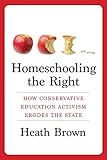Homeschooling the Right : How Conservative Education Activism Erodes the State / Heath Brown.
Material type: TextPublisher: New York, NY : Columbia University Press, [2021]Copyright date: ©2021Description: 1 online resource : 29 b&w charts, graphs, and tablesContent type:
TextPublisher: New York, NY : Columbia University Press, [2021]Copyright date: ©2021Description: 1 online resource : 29 b&w charts, graphs, and tablesContent type: - 9780231548014
- 371.042 0973 23
- LC40 .B77 2021
- online - DeGruyter
| Item type | Current library | Call number | URL | Status | Notes | Barcode | |
|---|---|---|---|---|---|---|---|
 eBook
eBook
|
Biblioteca "Angelicum" Pont. Univ. S.Tommaso d'Aquino Nuvola online | online - DeGruyter (Browse shelf(Opens below)) | Online access | Not for loan (Accesso limitato) | Accesso per gli utenti autorizzati / Access for authorized users | (dgr)9780231548014 |
Frontmatter -- CONTENTS -- INTRODUCTION -- 1. A THEORY OF CONSERVATIVE FREEDOM POLICY FEEDBACK -- 2. THE DEVELOPMENT OF HOMESCHOOL POLICY -- 3. DESIGN OF HOMESCHOOL AND CHARTER SCHOOL POLICY -- 4. THE PILLARS OF HOMESCHOOLING -- 5. HOMESCHOOLING ORGANIZATIONAL FEEDBACK AND COMMUNICATIONS -- 6. STATE AND LOCAL MOBILIZATION AND POLICY CHANGE -- 7. POLITICAL BEHAVIOR AND COMMUNITY EFFECTS -- CONCLUSION -- Acknowledgments -- Appendix -- Notes -- Index
restricted access online access with authorization star
http://purl.org/coar/access_right/c_16ec
For four decades, the number of conservative parents who homeschool their children has risen. But unlike others who teach at home, conservative homeschool families and organizations have amassed an army of living-room educators ready to defend their right to instruct their children as they wish, free from government intrusion. Through intensive but often hidden organizing, homeschoolers have struck fear into state legislators, laying the foundations for Republican electoral success.In Homeschooling the Right, the political scientist Heath Brown provides a novel analysis of the homeschooling movement and its central role in conservative efforts to shrink the public sector. He traces the aftereffects of the passage of state homeschool policies in the 1980s and the results of ongoing conservative education activism on the broader political landscape, including the campaigns of George W. Bush and the rise of the Tea Party. Brown finds that by opting out of public education services in favor of at-home provision, homeschoolers have furthered conservative goals of reducing the size and influence of government. He applies the theory of policy feedback—how public-policy choices determine subsequent politics—to demonstrate the effects of educational activism for other conservative goals such as gun rights, which are similarly framed as matters of liberty and freedom. Drawing on decades of county data, dozens of original interviews, and original archives of formal and informal homeschool organizations, this book is a groundbreaking investigation of the politics of the conservative homeschooling movement.
Mode of access: Internet via World Wide Web.
In English.
Description based on online resource; title from PDF title page (publisher's Web site, viewed 01. Dez 2022)


